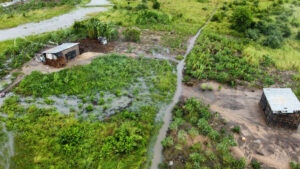Joint Statement by H.E. Ambassador Margarida Rosa Da Silva IZATA, Head of the African delegation to the Unitaid Executive Board, and Dr Philippe Duneton, Executive Director, Unitaid

Cyclone Freddy, Mopeia District, Mozambique. Photo credit, Eldo Elobolobo, BOHEMIA project
Climate change, insecticide resistance, invasive mosquito vectors, and the growing threat of drug resistance are creating a challenging environment for public health efforts to control and eliminate malaria in Africa.
Africa carries by far the highest burden of malaria of any region, with an estimated 595,000 deaths in 2021, the vast majority of them among children under the age of five. About 70 percent of all malaria cases and deaths are concentrated in 11 countries, all but one of them in Africa.
The WHO has warned that the geographical footprint and intensity of vector-borne diseases such as malaria are set to grow with global warming. Scientists expect mosquitoes will reproduce faster as temperatures rise, increasing the likelihood of disease transmission.
Cities in coastal areas in Africa are becoming more vulnerable to frequent seasonal flooding, which also increases the risk of vector-borne diseases, and extreme weather events are on the rise. South Africa experienced torrential flooding on an unprecedented scale on its eastern seaboard in 2022. This year Mozambique received more than a year’s rainfall in four weeks.
Meanwhile, some areas face alternating floods and drought, which is accelerating migration to cities, where malaria outbreaks may become more common.
The spread of Anopheles stephensi, an invasive mosquito species that thrives in cities and can transmit both Plasmodium falciparum and Plasmodium vivax malaria parasites, is a new threat. The mosquito, which is native to South Asia and the Arabian Peninsula, has been detected in a growing number of African countries and is resistant to many insecticides in current use. Scientists are investigating links between climate change and the spread of the species.
The WHO considers the invasion of Anopheles stephensi to be a major potential threat to malaria control and elimination in Africa. If Anopheles stephensi establishes itself in Africa’s fast-growing cities, malaria cases could increase rapidly, and undermine the gains made in reducing the burden of disease.
As the impact of climate change evolves, other biological threats are causing concern. Mosquitoes that transmit malaria are developing resistance to the insecticides used to repel or kill them. In addition, there is growing parasite resistance to artemisinin, the main component of the best available medicines to treat malaria. Resistance first emerged in South-East Asia but is now increasing on the African continent. The urgency and potential implications of antimalarial drug resistance have generated a call to action within the global health community. In November 2022, WHO published a Strategy to respond to antimalarial drug resistance in Africa – a technical and advocacy document aimed at minimizing the threat and impact of artemisinin resistance.
Encouragingly, a spate of innovations, many of them funded by Unitaid, are meeting the challenges head-on and show potential to radically alter the landscape.
A top priority is to ensure the continued effectiveness of insecticide-treated nets and mitigate resistance. Insecticide-treated nets have been a mainstay of the malaria response for decades, and remain, as WHO states, an essential “pillar of malaria control.”
Unitaid is working on new vector control tools that are predicted to deliver a reduction in malaria by more than a quarter by 2030. Promising initiatives include new bed nets with different combinations of insecticides to counter mosquito resistance; spatial repellents that release chemicals into the air to prevent mosquitoes from biting humans within a given space; and treatment of humans and livestock with drugs that kill mosquitoes who bite them.
“A complex array of issues including climate change and insecticide resistance are bearing down on efforts to control malaria in Africa,” said Unitaid’s Executive Director, Philippe Duneton. “Unitaid is committed to ensuring widespread adoption of a new generation of vector control tools to ensure we have what it takes to beat the disease.”
Treatments to prevent malaria in pregnant women and children at risk of infection in the rainy season, as well as new malaria vaccines, are also gaining traction as years of pioneering work funded by Unitaid pays off. In its strategy to respond to antimalarial drug resistance in Africa, WHO lists chemoprevention and vaccines as key interventions. Although vaccine hesitancy or refusal remains a concern.
There is no time to lose. The evidence shows we are falling well behind ambitious WHO targets to reduce malaria case incidence and mortality rates by at least 75 per cent by 2025 and at least 90 percent by 2030, from a 2015 baseline.
Funding is less than half of what is required globally to stay on course to end malaria as a major public health threat.
In view of the tight funding constraints, we need to step up the pace of R&D, product introduction, and market-shaping activities. Overcoming barriers to accessing promising innovations will be critical to getting Africa back on a path to malaria elimination.
Unitaid is soliciting proposals and investment partners to mitigate antimalarial drug resistance in Africa and will soon launch a call for proposals to build effective delivery strategies for new vector control tools to catalyze adoption and address emerging threats.
Africa has a huge role to play in advancing the fight against malaria. “With Africa bearing such a heavy disease burden, there is a strong need for African leadership to tackle malaria, based on robust primary health care services and accelerated introduction of new products and techniques.,” said H.E. Ambassador Margarida Rosa Da Silva IZATA, Head of the African delegation to the Unitaid Executive Board.
Related publications:
Media contact:
For more information and media requests:
Hervé Verhoosel
Team Lead, Communications
M: +33 6 22 59 73 54